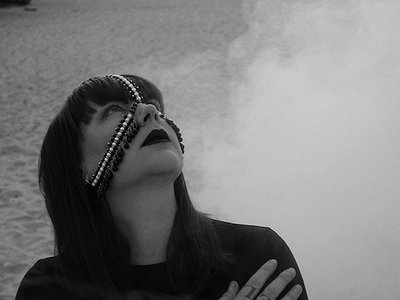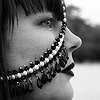Part 2
Collaborations can take on many forms. What role do they play in your approach and what are your preferred ways of engaging with other creatives through, for example, file sharing, jamming or just talking about ideas?
Collaborating, let's say I was born in it. With The Hacker. Even if I don’t consider our story as a «collaboration». We are a band. But I did it for a very long time, with lots of different people, because I am probably gifted in understanding the other one’s universe, mood, vibe, where he wants to go, or where I think WE should go together with the track. It has a lot to do with psychology to be honest.
I used to have to fly to the person’s studio to record, before the Internet. Now it’s easier, I can work from home. But I am slowing down collaborations. For most proposals I get, I don’t really see the intellectual benefit for me, it’s just repeating myself, and for people to have my name next to theirs. I became like a « vocal brand » and I must keep a distance from it to keep the quality.
Could you take us through a day in your life, from a possible morning routine through to your work? Do you have a fixed schedule? How do music and other aspects of your life feed back into each other - do you separate them or instead try to make them blend seamlessly?
I am slow in the morning, even though I don’t go to bed late. I want to live by day fully, after spending so much time in nightlife. I have breakfast, I take my time. I read, I listen to the radio, or I go horse riding. I spend most of my day with horses. I don’t look at my phone, instagram, I can avoid opening my computer for days… It’s not like i became lazy, I am more active than ever before, but I am away from music during the week. I need it. To have a real life with normal people. I work on my DJ sets the day before I have to work. That's all.
There are many descriptions of the ideal state of mind for being creative. What is it like for you? What supports this ideal state of mind and what are distractions? Are there strategies to enter into this state more easily?
My ideal state of mind is peace of mind. I do my best creation when I am happy, when I am calm, away from stress. Why? I think the depressive artist is a myth, as my vision of creativity is larger than your own little depressive state of mind. I need to connect with something bigger, more universal, with a meaning, to elevate myself too. That’s my thrill, as an artist. Since I live in the country, I have that luxury.
How is playing live and writing music in the studio connected? What do you achieve and draw from each experience personally? How do you see the relationship between improvisation and composition in this regard?
Playing live is fun with The Hacker, but was never my thing as a solo artist. I did it, I am proud I tried that experience once, but I won’t do it again. I always much preferred to DJ, because I love to play other people’s music! When you play live, you have to play your own songs over and over, it can be very exhausting as a DJ to have to deal with that. Of course there’s nothing like playing a concert and the interaction with the crowd, as you can’t hide, you can’t cheat. It’s like theatre and films.
I need to write songs regularly, play as a DJ more regularly, and I enjoyed playing live from time to time. These 3 things made me who I am today, as a musician. I am very fortunate to have the 3 in my resume.
How do you see the relationship between the 'sound' aspects of music and the 'composition' aspects? How do you work with sound and timbre to meet certain production ideas and in which way can certain sounds already take on compositional qualities?
Sound has to reflect the emotions you have in mind, and it's like furnishing your home. And we don’t live in the same home all our life. I use images a lot, like photography. It helps me to find the right textures.
Our sense of hearing shares intriguing connections to other senses. From your experience, what are some of the most inspiring overlaps between different senses - and what do they tell us about the way our senses work? What happens to sound at its outermost borders?
I can’t answer that. We are all different, it’s everyone’s secret garden how we interact with the world and with music in particular. I can only say when my music is out, it doesn’t belong to me anymore somehow, it has its on life with each listener.
Art can be a purpose in its own right, but it can also directly feed back into everyday life, take on a social and political role and lead to more engagement. Can you describe your approach to art and being an artist?
I simply had no choice I guess. A survival instinct. At first you grow with it as an adult, and when you know yourself a bit more you become conscious of the responsibility it is to be an artist. Your role is to offer your vision that is most faithful to your emotions, beliefs and values. So it has a consequence. The question is always: what is my intention, what do I want to say, propose, share? That’s my definition.
It is remarkable, in a way, that we have arrived in the 21st century with the basic concept of music still intact. Do you have a vision of music, an idea of what music could be beyond its current form?
I don’t want to know. Mystery is the most exciting source of inspiration. I am very fortunate to have been part of the rise of the last music revolution. I don’t know what will be the next one, but I am very very lucky to have lived one. And I think that’s more than enough...






